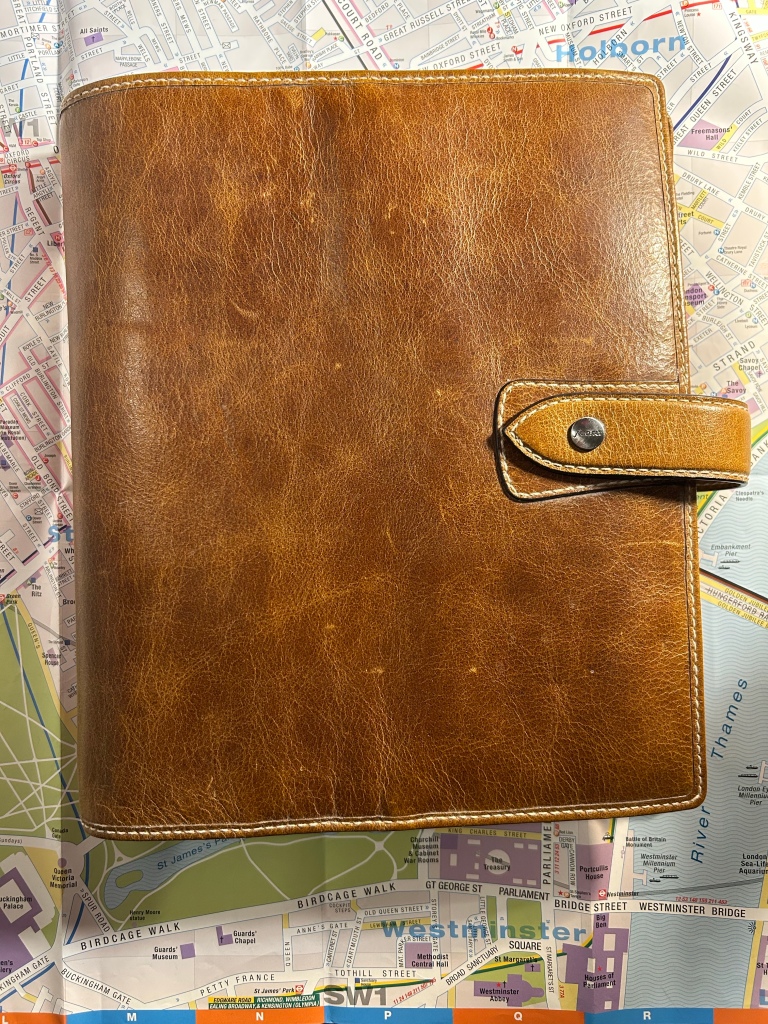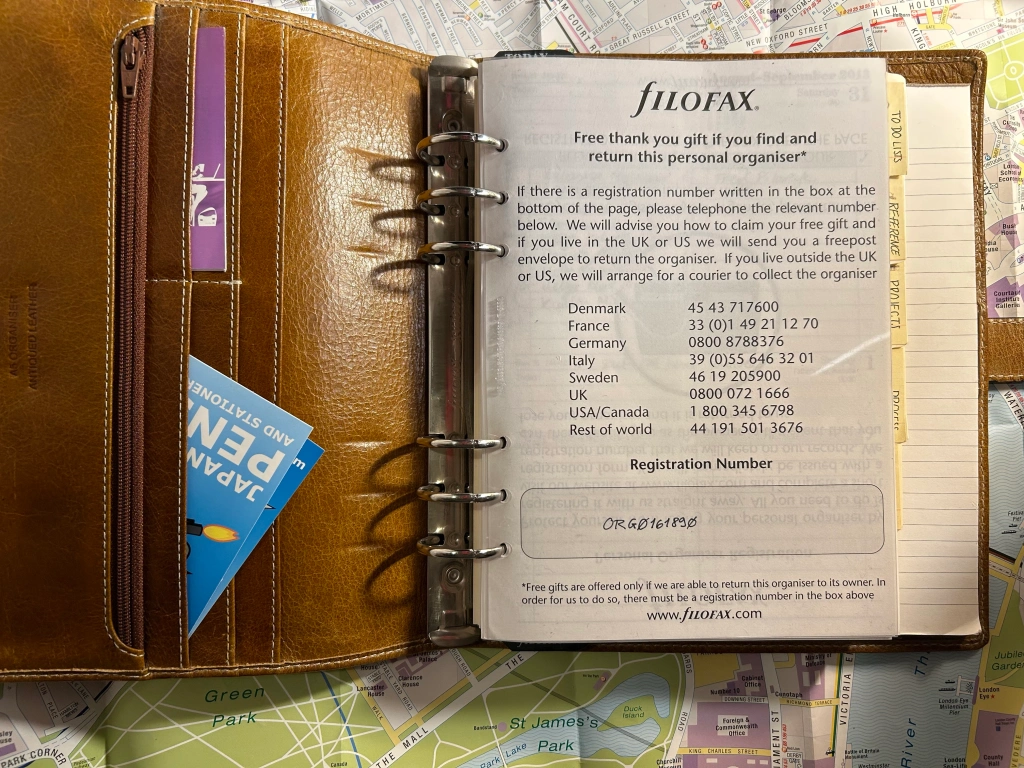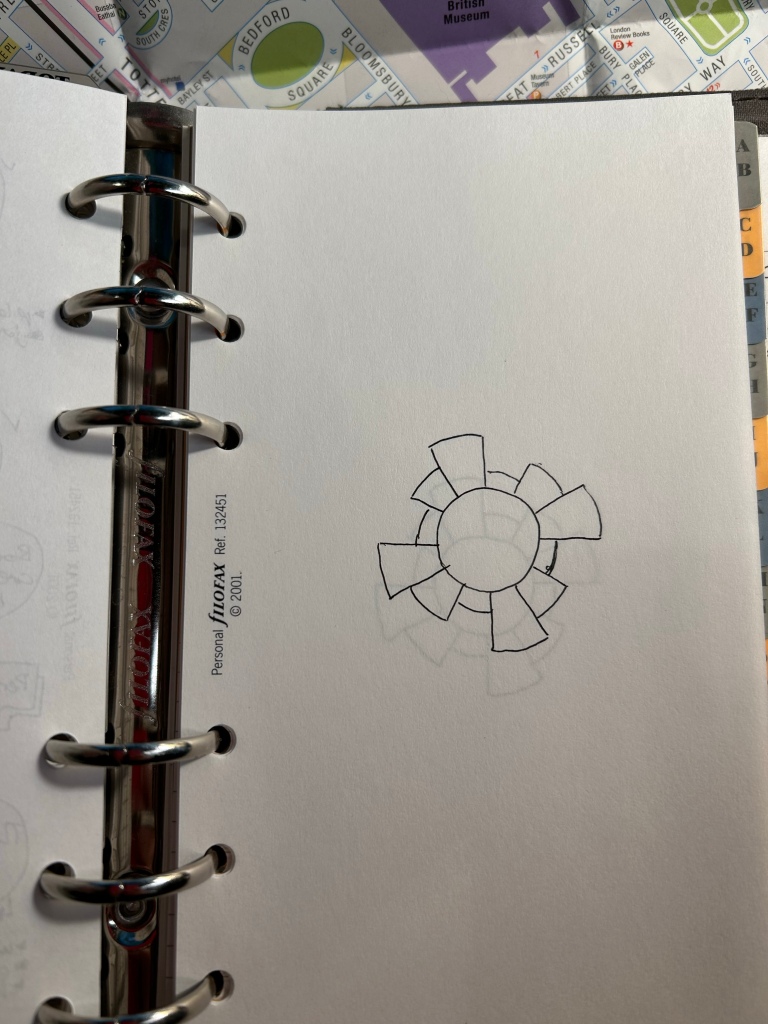In the early 2010s Filofax was all the rage (much like Plotter is now), and I was swept with the trend. I started by purchasing the Personal Urban, then quickly expanded to Pocket, Personal and A5 Filofaxes of various kinds (Urban, Malden, Classic, Cuban, Graphic, Bond, Finchley and more).

What drew me (and others) to them is the infinite customizability and the fact that these were gorgeous, well-made objects made by a brand with a history and good track record. Online communities that shared photos of spreads and setups started to grow around the brand, and unlike Moleskine and Moleskinerie, the company left them to their own devices. Some of them exist to this day (like the delightful Philofaxy). The parallels with today’s boju and Plotter communities are pretty clear.

The promise of bujo (bullet journalling) and the Plotter are also the promise of the Filofax: build a planner/notebook hybrid system that matches your exact needs like a glove. Filofaxes are a joy to hold in your hand: they are beautiful, tactile objects that feel good and are exquisitely well made.

They weren’t cheap, but if you waited patiently or were willing to buy second hand you could get some really great deals, and they lasted forever. The refills, much like Plotter ones, were the real expense. Yes, you could buy a specialized hole punch for them and create your own refills, but most people just bought them from Filofax themselves or from Filofax compatible sellers. Which refills you bought depended mostly on the purpose of the Filofax in question, and I had ones that had no planner inserts at all, only lined or blank refills and tabs.

The olive Personal Urban Filofax below was my first Filofax and my workhorse. I used it heavily from 2011-2013, and it was a heady nostalgia ride to dust it off and open it up again. It is very well made – fabric, pleather and ring mechanism are in perfect condition even after intense use and then years of storage. It is also a relic of a person that I lost when I went through cancer treatments, and I confess that reading over some pages made me want to cry. The things I worried about…

Do you want to see how much I was into Filofaxes? I even had a page in my Filofax where I planned my Filofax usage:

Some of the Filofax inserts were fountain pen friendly, but I didn’t use fountain pens with my Filofaxes at all. I used Pilot Hi-Tech-C Coleto multipens with them, and I spent a good amount of money on their refills (which would either get air bubbles and stop writing, break, or just simply run out much too quickly). I even combined my love for Filofax with my love for the Chronodex system for a while:

So why did I stop using my Filofaxes completely? The system was well made, full of promise, and could double as a notebook and triple as a wallet, so what went wrong?
It was a combination of things that made me put all my Filofaxes into boxes for storage:
- The stores in London closed down (first the Neal street one, then the one off Regent street), and it became harder to find Filofax refills in stationery shops in London (they never were available locally).
- The refills weren’t cheap, and with the price of shipping added and the price of using the pens that worked best with them, it just became prohibitively expensive to use the system, particularly if you had more than one Filofax running.
- The rings get in the way of writing. It’s a thing with all these systems, and whoever tells you that the rings don’t get in the way isn’t being candid. And no, you won’t be taking the refills out to write on them and then filing them back in, it’s just too inconvenient.
- Filofaxes are bulky and heavy, particularly when full (and they collapse when they aren’t filled). It’s a hassle to carry them around, even if you are using them as a wallet (they a aren’t great at being wallets).
- As with other planning systems – finding refills that have the week start on Sunday (because that’s when it starts here) was nearly impossible.

So why get into ring based systems like Filofax and Plotter? If you want one physical planner system that will function in more than one way at the same time, will allow you to customize it fully to your needs, and can be carried over from one year to the next, then these systems may be worth a try for you. I used my Filofaxes heavily during a very busy time in my life because I was able to set them up for all my needs, and particularly GTD (I’ll post about that system later on in this series).If you can work around the rings and can afford the system and the refills, the Filofax is a very well made object that may be able to help you fulfill your goals. It helped me apartment hunt, work on my degree, kickstart my running, and be a better manager at a busy and difficult time at work. I will forever have a soft spot for my Filofaxes, which is why I’ve never attempted to sell them.
Do I regret my Filofax obsession? No. Do I regret that I stopped using my Filofax planners? Also no. They were exactly what I needed at the time until they weren’t, and I believe that in the end a planning system needs to work for you, and not you for it. Something to remember whenever you are considering making a change in this area.
Gary Slinger
The week does NOT start on Sunday. That is merely a personal (and wrong) choice.
LikeLike
writingatlarge
It is not a personal and wrong choice here. I live in Israel and the week here starts on Sunday.
LikeLike
Gary Slinger
Sure, because your week ends on Saturday. Unlike… Here.
LikeLike
adventurepdx
Man, that’s some harsh opinion slinging there, Gary! You might reconsider calling out people’s choices when your blog hasn’t been updated since 2006, and the “check out my new blog” link goes basically nowhere. Glass houses…
Anyways, I’ve used planners that start on Monday (especially the ones from Japan) and have gotten used to it. But here in the U.S. the calendar week starts on Sunday, as evidenced by every wall calendar I’ve had in, since forever.
LikeLiked by 1 person
writingatlarge
This is the best answer ever 😂
You rock!
LikeLiked by 1 person
adventurepdx
Thank you!
LikeLiked by 1 person
Gary Slinger
Having a blog isn’t a pre-req to posting a blog comment. I /had/ a blog, and I had forgotten that WordPress stub was still there (I have a WordPress account because I don’t post anonymously). I just looked, and it literally says “moved” – well, where it moved, I closed down over a decade ago. So there’s that.
Saturday and Sunday are “the weekend”. Case closed…
And “here in the US” is a rather broad statement. Sat right here in Tampa, looking at every planner I have here going back pretty much that same decade and they all start on…. Yup. Monday.
LikeLike
adventurepdx
“Having a blog isn’t a pre-req to posting a blog comment.”
True. But when one slings around such strong opinions like you did, I’m naturally curious to see what this person is saying elsewhere. And when that link to blog ends up at a nothingburger of a site, well, I’m amused.
And I find it highly amusing that you say I make “broad statement(s)” when you do the same with your “Case Closed.” Note that I didn’t say “planner”, I said “wall calendar”. I’ve lived in many parts of the US, and all of the wall calendars I’ve ever seen start the week on Sunday. I’ve bought planners from stores in the US that have the week start on Sunday. There’s some out there that have Monday start, sure, but there are ones that start on Sunday too.
In any case, I defer to Wikipedia in cases like this rather than opinions of a Florida Man.
https://en.wikipedia.org/wiki/Week
“Most of Europe and China consider Monday the first day of the week, most of North America and South Asia consider Sunday the first day, while Saturday is judged as the first day of the week in much of the Middle East and North Africa.”
In any case, the author of the blog lives in a place where their week does start on a Sunday, so finding a planner that starts with Sunday is a valid concern for them. Belittling them like you did with your first comment wins no points with me. Case closed…
LikeLiked by 2 people
Gary Slinger
English Man th
LikeLike
graysummers
I had the Urban Filofax. Loved it. Gave it to my daughter a few years back. I had a plain black leather smaller Filofax for my nurse work organising. A really early vintage plain hard cardboard cover one (?1960’s but may be earlier) was Man Bag carried with sheets of various coloured notepaper inside for simple inclusions. Plans and Observations. Like holiday planning list, shopping list, Christmas gift intentions, sizes of walls, floor, needs for paint, wood, etc. for decorating a room, appointments, etc. Had a fold out year at a glance insert. Had a pocket Filofax as a diary only. Love Filofaxes. Like yourself I put them on a bookshelf and they are still there. Although. My fave is a leather Filofax that is not a true Filofax. Softer now from use and filled with hand made paper from India. I use a double hole punch and worked it out with oddly presented angles to get the six holes required. And yes, it does get tedious taking individual pages out to avoid the metal ring invasion limitations. Keep the pages in and change the angle of the pen. Unique results! Those two push down plates top/bottom of rings? To open up the rings? Discovered them years after owning my first one and struggling with opening/closing the rings’ robust build. That ‘Snap Shut!’ Frightening. Great post here. All the best.
LikeLiked by 1 person
writingatlarge
It’s so great learning that other people lived out of their Filofaxes for years. Like you mentioned, they are the “everything” planner/notebook/wallet solution. And I didn’t realise why the tabs were there too for a good long while!
LikeLiked by 1 person
Daphna Kedmi
Who would have thought that the question of which is the first day of the week and how the weekend is defined could create such strong emotions all the way from Tampa. The weekend in Israel is Friday and Saturday, and there’s really no case to close here.
Different countries and different cultures have different definitions of the day of rest, and subsequently of the day on which their week begins. “Case closed” definitely limits the ability to open your mind to other cultures. Now, that is clearly a choice.
LikeLiked by 1 person
Pingback: Ghosts of Planner’s Past: Bullet Journalling – Writing at Large
Roger Houghton
“Saturday and Sunday are “the weekend”. Case closed…”
Doesn’t a week, like a piece of string, have two ends?
LikeLike
Alex
How do you organise your life now, post Filofax?
LikeLiked by 1 person